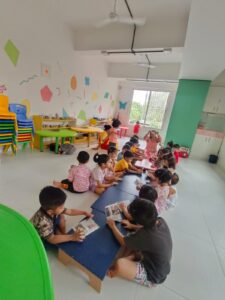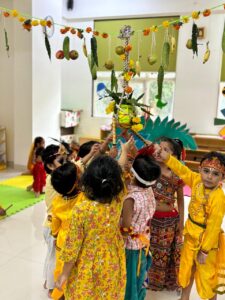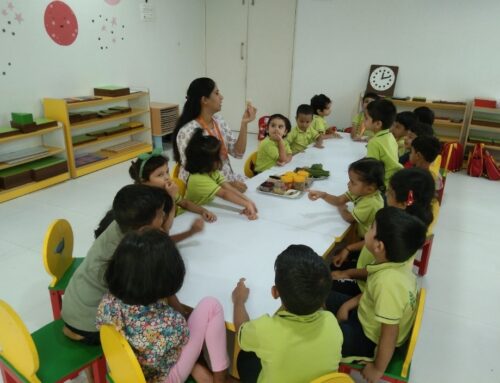Montessori education is renowned for its holistic and child-centered approach to learning. One of the most fascinating aspects of Montessori early childhood development is its adaptability to various cultures and traditions. At Uudaan Montessori Preschool, we believe that integrating cultures and traditions into early education enriches the learning experience and supports a child’s overall growth. In this blog, we will explore the role that cultures and traditions play in Montessori education and why they are vital for shaping young minds.
Understanding Montessori Education
Before diving into the role of culture and traditions, it’s essential to grasp the fundamentals of Montessori education. The Montessori method, developed by Dr. Maria Montessori, is based on the premise that children are naturally curious and eager to learn. The method emphasizes independence, hands-on learning, and respect for a child’s natural psychological development.
At Uudaan Montessori Preschool, we incorporate these core principles into our early childhood programs in Dhokali. Each child is encouraged to explore, think critically, and learn at their own pace. The Montessori environment provides freedom within boundaries, fostering cognitive, social, and emotional development.

Why Cultures and Traditions Matter in Montessori Education
1. Building a Strong Sense of Identity
Cultures and traditions serve as a foundation for children to develop a sense of identity and belonging. When children are introduced to their own practices and those of others, they begin to understand the diversity of the world. In a Montessori setting, this diversity is celebrated. Through activities such as storytelling, music, art, and festivals, children learn to appreciate the richness of various traditions.
For example, at Uudaan Montessori Preschool, we introduce children to local festivals such as Diwali, Eid, and Christmas through interactive activities like storytelling, art, and performances. By doing this, children not only learn about these traditions but also see their own roots reflected in their learning environment. This helps in strengthening their identity and instilling pride in their heritage.
2. Enhancing Social and Emotional Learning
Cultures and traditions are integral to the development of social and emotional skills in early childhood. Through the celebration of different traditions, children learn values such as empathy, kindness, and respect for others. When children are exposed to various cultures, they begin to understand that different beliefs, languages, and practices coexist. This fosters an environment of inclusion and acceptance, which is a core principle of Montessori education.
At Uudaan Montessori Preschool, part of our early childhood programs in Dhokali involves teaching children about customs from different parts of the world. We encourage students to participate in activities that involve exchange, like preparing traditional foods, dressing in ethnic attire, or learning folk dances. Such activities create a sense of community among children, helping them appreciate and respect diversity.
3. Nurturing Cognitive Development
Cultures and traditions offer rich opportunities for cognitive development. Many traditional activities involve storytelling, music, art, and hands-on learning, all of which are key components of the Montessori method. When children engage in traditional practices like making rangoli or crafting holiday decorations, they are enhancing their fine motor skills, spatial awareness, and creativity.
Storytelling, for example, is a powerful tradition used worldwide. It stimulates the imagination, strengthens memory, and introduces children to moral lessons. At Uudaan Montessori Preschool, we incorporate stories from different cultures and traditions to broaden children’s worldviews and encourage their cognitive growth. This multicultural approach not only enriches the learning experience but also aligns with Montessori’s emphasis on diverse and meaningful educational content.
4. Encouraging Language Development
Language development is a crucial aspect of early childhood education, and cultures and traditions play a significant role in expanding a child’s vocabulary and communication skills. In a multicultural Montessori environment, children are often exposed to multiple languages and dialects through songs, stories, and conversations.
At Uudaan Montessori Preschool, we integrate songs, rhymes, and stories from various traditions as part of our early childhood programs in Dhokali. This not only enhances language skills but also fosters a love for storytelling and expression of culture and traditions. Children who are exposed to diverse linguistic inputs at an early age develop stronger communication abilities and a deeper understanding of contexts.
5. Fostering Creativity and Expression
Cultures and traditions are deeply intertwined with creative expression. Festivals, art forms, music, and dances are all expressions that encourage children to explore their own creativity. In a Montessori classroom, the arts are an essential tool for self-expression and development.
By incorporating art and music from different cultures, Uudaan Montessori Preschool allows children to experiment with different forms of creativity. For instance, traditional folk music, dance, and crafts from various regions provide children with a wide range of sensory experiences, which are crucial in the Montessori learning process. Children learn to express themselves through painting, drawing, dancing, and singing, which enhances their creativity and helps them develop a well-rounded personality.
Cultures and Traditions in Montessori: A Holistic Approach
Montessori education aims to develop the “whole child,” and cultures and traditions are vital in this pursuit. By integrating these practices into Montessori classrooms, we nurture not only a child’s intellect but also their emotional and social intelligence. This creates a strong foundation for lifelong learning.
At Uudaan Montessori Preschool, we recognize the importance of culture in shaping early childhood development. Our early childhood programs in Dhokali are designed to embrace diversity while offering each child the freedom to learn and grow at their own pace.

The Montessori Approach and Culture Sensitivity
One of the reasons why cultures and traditions fit so seamlessly into Montessori education is the inherent focus on sensitivity and respect. Montessori teachers are trained to observe and understand each child’s background, ensuring that traditions are presented in a manner that respects their uniqueness. This aligns with Montessori’s global perspective on peace, tolerance, and mutual respect.
In our early childhood programs in Dhokali, we strive to offer a culture and traditions sensitive learning environment where children can explore different traditions while feeling secure in their own identities. Whether through festivals, stories, or hands-on activities, we foster an appreciation for culture and traditions that enrich the learning journey.
Conclusion
Cultures and traditions play an indispensable role in Montessori early childhood development. They provide children with a sense of identity, promote social-emotional learning, stimulate cognitive and language development, and foster creativity. At Uudaan Montessori Preschool, we value the integration of cultures and traditions into our early childhood programs in Dhokali, offering children a well-rounded and enriched educational experience that prepares them for the diverse world ahead. Contact us to learn more about how we incorporate culture and traditions into our Montessori programs.




